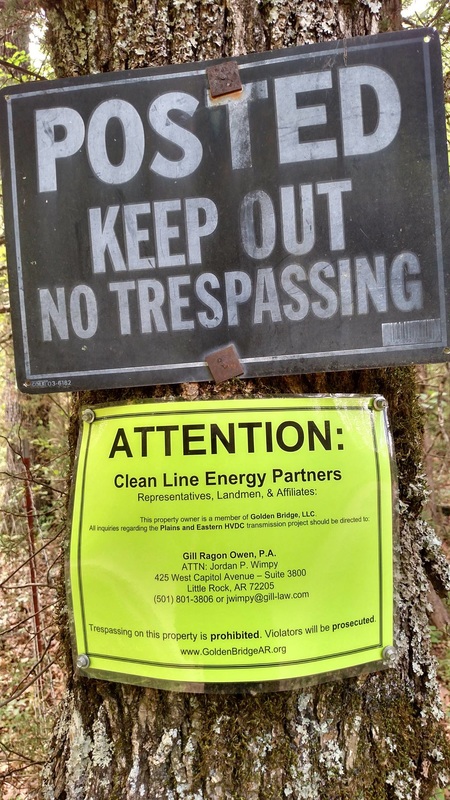involving Clean Line contractors
To: [email protected]
Subject: Violation of Code of Conduct
Well, I had an interesting encounter with some Clean Line people this morning. A surveying crew came to my house this morning. Of course, they would not admit to working for Clean Line. I later received a call from a Clean Line representative, asking for permission to enter my property and denying any knowledge of the surveyor crew.
You can read my description of today's events below, but here is the summary. A survey crew tried to gain access to private property by misrepresenting themselves and a Clean Line rep denied the crew works for Clean Line.
Two surveyors came to my house, asking for permission to enter property that I rent from my neighbor just to the north of my property. One of them told me that my neighbor had referred them to me. This fellow told me he was working for the Arkansas Game and Fish Commission and he wanted to shoot the corners of the AG&F property which is adjacent to my neighbor's property and my property. I quizzed him about who he worked for. He told his company was under contract to do the work for the AG&F. (Later, I called my neighbor and she said the fellow told her he was doing work for the AG&F.) I asked for written proof of who he was and that his company was doing work for the AG&F. He did not have any proof, not even a business card. I told him I would have to see proof of who he is and who he is working for. I apologized for the inconvenience. I told him Clean Line was trying to get access to our property and for all I knew he could be from Clean Line.
I asked the surveyor if he was doing work for Clean Line and he said no.
I contacted the manager of the AG&F management area. He said the AG&F did not have a survey crew checking the property lines. He said he was aware of a Clean Line crew doing an environmental survey in the area.
As soon as the two surveyors left, I started trying to call the AG&F manager. While on my cell phone, I received a call on the land line. I asked the caller to call back. About an hour later a Clean Line rep called, asking for permission to enter my property. He said he was the person who tried to call earlier. I told him about the incident with the surveyors and he denied knowing anything about a survey crew trying to get access to my property. He said it was a big coincidence that he just happened to call a few minutes after the survey crew left.
To recap. The survey crew said they were doing work for the AG&F. The AG&F said the surveyors were not working for them. Clean Line is trying to get private property access to do their environmental survey. It stretches the bounds of credulity to imagine that the survey crew does not work for Clean Line. The incident is compounded by having a Clean Line rep deny any knowledge of it.
Is this the vaunted Code of Conduct the Department of Energy had in mind when it entered into unholy matrimony with Clean Line?
The landowner also reports that the Clean Line representative that contacted him via telephone minutes after he refused entry to the "surveyors" touted himself as a Christian who would never lie, as if God himself had blessed Clean Line's actions.
During our conversation, the CL rep said he didn't know anything about a property line survey crew. The only surveys he knew anything about were the environmental surveys. When I told him I didn't believe him, he told me he was a born again Christian and he wouldn't lie.
Twelve days later, the landowner received this lame response from the U.S. DOE:
From: "Lawrence, Christopher" <[email protected]>
Date: June 14, 2016 at 11:01:44 AM CDT
To: Landowner
Subject: RE: Violation of Code of Conduct
Hello Mr. Landowner,
Thank you for raising this concern. The Department takes the requirements of the Participation Agreement very seriously. The Participation Agreement includes numerous protective measures for property owners, including, as you mention, the Code of Conduct at Schedule 12. The matter of your concern will be discussed with Clean Line and, as needed, Clean Line's compliance with all of its contractual responsibilities under the Participation Agreement will be clarified.
Christopher A. Lawrence
Electricity Policy Analyst
National Electricity Delivery Division
Office of Electricity Delivery and Energy Reliability
U.S. Department of Energy
O-(202) 586-5260
F-(202) 586-8008
[email protected]
Let's see how many violations of the Code of Conduct occurred in this instance:
All communications with property owners and occupants must be factually correct and made in good faith.When contacting a property owner in person, promptly identify yourself as representing Plains & Eastern.
- Do not make false or misleading statements.
- Do not purposely or intentionally misrepresent any fact.
Landowners who experience a violation of Clean Line's "Code of Conduct" should promptly report all violations to the U.S. DOE. Our government needs to acknowledge its responsibility for all abuses of public trust perpetrated by its "partner" in this unnecessary transmission project.
Landowners should also be in touch with the folks at Golden Bridge, who are keeping a record of landowner contacts gone awry. Contact them at [email protected]. You could additionally report Clean Line's transgressions to the Arkansas Attorney General. And if you believe "surveyors" are misrepresenting themselves as working for a state agency, do contact that state agency to report the incident. No state agency wants to end up legally responsible for damage to private property caused by "surveyors" who are not authorized by their agency.
Shame on you, Clean Line!
Shame on you, U.S. Department of Energy!


 RSS Feed
RSS Feed